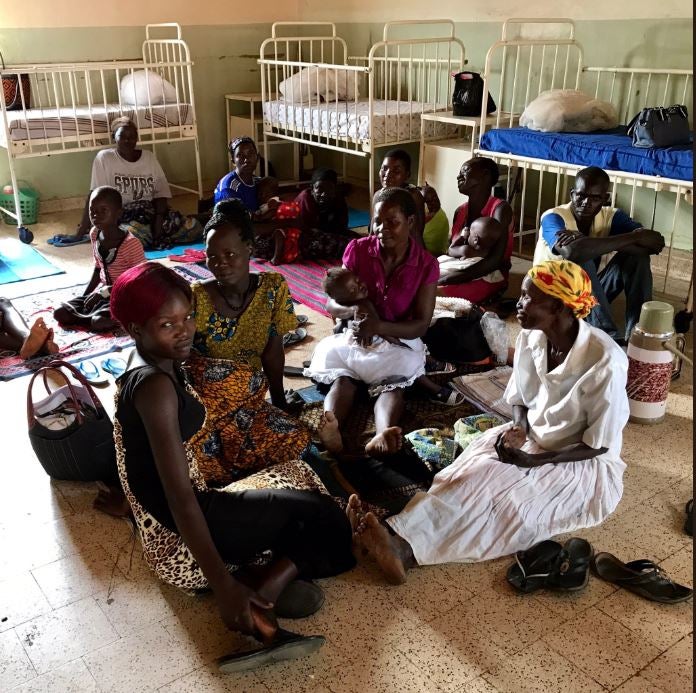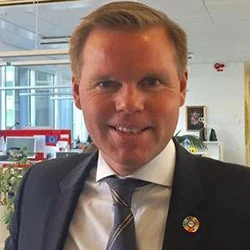 Hospital in Uganda
Hospital in Uganda
About 78% of refugees are displaced for more than five years, and the vast majority of them live in developing countries. This statistic alone shows why forced displacement is a complex development challenge as much as it is a humanitarian one. And it underlines the imperative for all responses to this crisis to commit to evidence-based decision-making for the benefit of some of the most vulnerable people in the world -- the estimated 70 million people forcibly displaced by conflict and persecution, in addition to their host communities.
I had the chance to see what this means back in 2017, when I visited the district of Adjumani in Northern Uganda as the World Bank Group’s Special Representative to the United Nations. Adjumani had recently experienced a massive influx of refugees from neighboring countries. At the time, newly arrived refugees made up close to 60 percent of the total local population. To adequately care for such changes in the demographics of a small region requires a massive data collection effort.
Beyond knowing the aggregate numbers, local communities as well as humanitarian and development partners need to understand gender and age breakdowns of the population, their health statuses, levels of education, skills, income, etc. Health facilities need to be staffed and supplies provided, new schools must be built and teachers recruited, and infrastructure needs to be strengthened to allow goods and services to flow.
Over and above the local level, I observed how government representatives and their humanitarian and development partners were craving for reliable and timely data to understand needs and allocate resources efficiently and effectively. As I saw the overfilled classrooms and the overfilled healthcare facilities, the opportunities missed by lack of meaningful data stuck in my mind. It’s all the more disheartening to see firsthand how this impacts the lives of the Ugandans who are already living under extraordinary circumstances of duress, uprooting, and trauma -- Uganda has the largest refugee population in Africa.
Data is also essential from the point of view of host communities, which are often tremendously strained. To maintain a sense of solidarity with the refugees, host communities must perceive that they are not being overlooked but are in fact also benefiting from this new situation. And these perceptions need to be backed up by reliable evidence.
The new World Bank-UNHCR Joint Data Center on Forced Displacement in Copenhagen was inaugurated on October 10 by UN Secretary General, António Guterres with Danish Development Minister, Rasmus Prehn. It seeks to fill this critical void. It fulfills the long-held aspiration to ensure effective, reliable, publicly available data to inform decision-making for both the development and humanitarian communities; and to improve the collection, analysis and public dissemination of household level socioeconomic data on those who are forcibly displaced. Or, as Secretary General Guterres said, “We are dealing with a population that absolutely requires, not only our commitment, our engagement, our support, but that that commitment, that engagement and that support is accurate because we can't afford to do the wrong thing with people that have so basic and dramatic needs.”
The JDC is the result of a strong, shared vision and many years of work by the World Bank and UNHCR to set up a collaborative structure where experts from both organizations will sit together physically to ensure timely decisions informed by evidence.
The formal inauguration followed the first JDC Strategic Advisory Council gathering, which brought together representatives of host countries, NGOs, academics, and international organizations working on forced displacement. The agenda that emerged includes:
- Supporting the strengthening of the global data collection system;
- Strengthening microdata collection and analysis;
- Enhancing existing data management;
- Stimulating innovation; and
- Establishing partnerships and creating space for knowledge sharing.
- All of the JDC’s activities will be aligned with three core principles that underpin it, which are critical to both institutions -- Keep it relevant to projects and operations on the ground – Avoid duplication – and Aim for technical excellence.
It is humbling to think about the magnitude of this undertaking and the challenges that lie ahead, but satisfying to know that we have taken on big step forward to ensure better data, better analysis, and ultimately better decisions and results that serve both the forcibly displaced and their hosts.



Join the Conversation